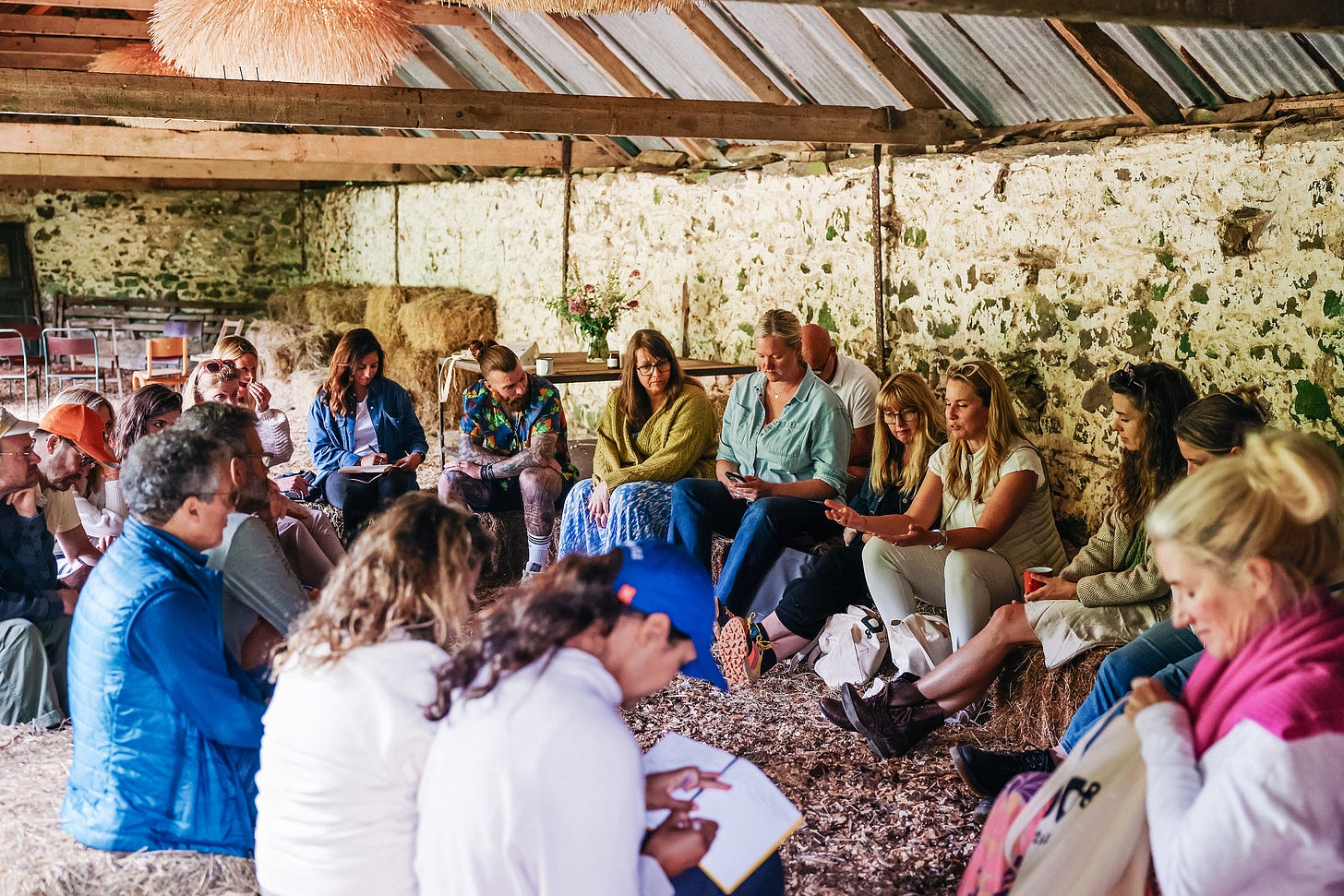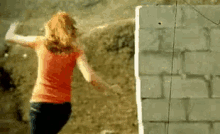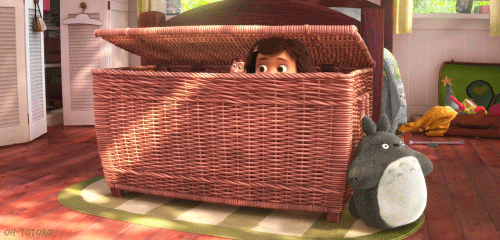#135: Playing it safe isn't keeping you safe.
A widow's guide to trading fake security for real possibility
The Luminist is a reader-supported publication that illuminates the pain, the pleasure, and the paradox on the path to technicolor living. Subscribe below to receive posts about how loss teaches us to get the most out of life (along with silly gifs) in your inbox every Saturday.
The rectangle was supposed to keep me safe…
It was the Spring of 1985, junior year sociology class. Mr. Perry passed out a worksheet with one instruction: “Draw yourself 20 years from now.”
I set to work with the focused intensity of someone whose drawing skills peaked in cave paintings. One neat stick figure (me), one house, two tiny stick kids, one tall stick husband. Mountains. Sun. All perfectly contained within the sheet’s pre-printed, bold-lined rectangle, like a good little future should be.
“Time's up! Share with your neighbor.”
I glanced at my best friend Cara's paper and nearly hyperventilated. Her future was everywhere — stick figures and squiggly lines and God knows what else spilling off the edges, climbing the margins, absolutely refusing to be contained.
She was drawing outside the lines.
Wait, what? My Presbyterian soul recoiled. Isn’t that rectangle there for a purpose? Aren’t we supposed to stay within the lines?
Then Mr. Perry asked the question that I dreaded…
“So how many of you kept your rendering within the confines of the rectangle?”
Me and a few other suckers raised our hands. He explained that drawing inside the lines shows that your imagination of the future has limits, and we could benefit from both literally and figuratively thinking outside the box. But I wasn’t buying that my instinct to contain and constrain was a bad thing. Cara’s boundary breaking abundance — her future life messily, dangerously filling the page — made me itchy and uncomfortable. Lines existed for a reason: to shield you, protect you, and most importantly, to guarantee the right outcome.
Cara was crossing those lines at her own peril.
My Ride-or-Die: Rigidity
Turns out that rectangle panic wasn't just teenage anxiety — it was my entire life strategy.
I spent the next 30 years as a line absolutist. I worshipped at the altar of doing things “right” so everything would turned out “right”. I actively hunted down structures with detailed instructions, printed out rule books in triplicate, highlighted the shit out of them, then executed them down to the last footnoted, single-spaced, microscopic instruction.
I took the first job offered out of college without considering if I actually liked it. Parlayed that into business school, then a better job, then a better job, then a better job. Met my Prince Charming and married him on schedule. Defined myself by my carefully managed everything — work success, polished appearance, Ironman finishes.
But rather than feeling constrained, this steel-rod approach made me feel invincible.
Certainty was my security blanket. I wrapped myself in it daily, convinced that if I just knew enough, planned enough, controlled enough, I could prevent the unexpected from ever darkening my perfectly rectangular door.
Then… my rule-following, healthy-eating, exercise-obsessed, doctor-visiting Prince Charming dropped dead.
Of a heart attack.
At age 50.
All that line obeying, all that instruction following, all that meticulous executing of the equation “control = safety” turned out to be complete and utter bullshit. I was following every rule book every written, but none of them warned of this outcome. None of them even hinted that things would go even a little wrong, let alone this wrong.
Now I was facing a murky future without the love of my life, clutching a stack of useless rule books whose only remaining purpose was kindling for the bonfire where my perfectly planned life used to be.
Trading Fake Surety for Real Uncertainty (aka Life)
So I let those rule books burn. What had they gotten me anyway? As far as I could tell, a rigged game where I did all the work and life still got to sucker-punch me.
This realization crashed my brain's operating system. It was Y2K, but in my own head. Every prediction model I'd built about how life works — work hard, follow rules, get predictable outcomes — got wiped clean.
But here's the weird thing: that total system failure turned out to be less of a breakdown and more of a breakthrough.
A breakthrough into openness, into endless possibility, into mystery, and into delight.
According to neuroscientist Lisa Feldman Barrett, we're basically walking prediction machines, constantly forecasting what's about to happen based on past experiences. But when those foundational experiences get nuked by, say, a profound and unexpected loss? Your brain suddenly gets a lot more creative about what might be possible.
As Barrett puts it, “Everything you learn today seeds your brain to predict differently tomorrow.”
So the blast zone where my life used to be understandably resulted in some new ways of thinking:
All those rigid beliefs about how life “should” work suddenly felt flimsy. I didn’t have to try to think outside the box. The box now just looked like a joke.
My thinking became very… flexible. It’s almost as if I could feel my neurons rewiring. I don’t have science to back this up, but I wouldn’t be surprised if neuroplasticity spikes after major life disruptions.
I wasn’t locked into my old reactions. Instead of defaulting to fear-based interpretations, I got to consciously pick new “action plans” for how to meet and respond to uncertainty.
Possibility became my go-to assumption. Without my old certainties clogging up the works, I could imagine entirely new futures.
The result? I traded fake surety for true uncertainty — and discovered that while uncertainty doesn't guarantee rainbows and unicorns, it does guarantee the chance to be surprised and even delighted by the world in ways my former rigid self could never have experienced.

Breakthrough Without the Breakdown
So, do we have to wait for life to demolish us to access this kind of transformation?
Hell no.
While my awakening came courtesy of devastating loss, I've watched friends courageously and intentionally step beyond their own rectangles — leaving behind their comfort zones, questioning beliefs they'd never examined, choosing uncertainty over false security.
The friend who quit his soul-crushing consulting gig to become a coach (and makes less money while being more happy). The couple who sold everything to travel the world (and discovered they needed way less stuff to feel way more alive). The woman who finally left the relationship that was slowly suffocating her spirit (and found herself again in the process).
They didn't wait for catastrophe to force their hand. They chose to bend before life made them break.
The key seems to be willingness — willingness to release our grip on the illusion of control, to question what we think we know, to experiment with being someone slightly different than who we’ve always been.
As Barrett’s research shows, our brains are constantly learning and adapting. We just have to give them permission to predict differently.
There Never Was a Rectangle
If Mr. Perry handed me that same worksheet today, I'd probably start laughing and draw all over the dang page — pilgrim paths and London streets and treehouses and trips to South America. “Impossible” dreams would spill into the margins; I’d even flip the paper over to add still more life that refuses to be contained.
Because I've learned that the lines we think protect us are often the very things that imprison us. The rectangle isn't safety — it's limitation disguised as security.
Because, let’s be clear: security doesn’t exist.
Just ask Mike, that handsome devil who never ate a single piece of red velvet cake, who never missed a workout, who went to the doc every six months, still had a life-ending heart attack 15 years before retirement.
In other words, life is unpredictable no matter what you do. But only beyond the confines of the rectangle will you realize that it’s also endless in its possibility, full of unexpected delights, and sometimes even flashing you miracles from under it’s skirt.
So I dare you: Step beyond the box. Take up the whole damn page.
Giddy with what you’ll draw there,









If only Mr Perry could have framed it up like this!
Breakthrough!